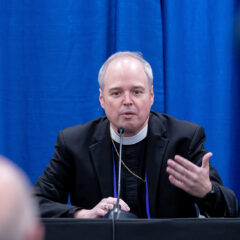(RNS) — It is shaping up to be a complicated Independence Day for the Episcopal Church. We were once the church of the Founding Fathers and presidents—34 of the 56 signers of the Declaration of Independence were members of what became our church after the Revolution, and 11 presidents, including George Washington, have professed our faith. Today, however, we are known less for the powerful people in our pews than for our resistance to the rising tide of authoritarianism and Christian nationalism emanating from Washington, D.C.
When religious institutions like ours enjoy easy coexistence with earthly power, our traditions and inherited systems can become useless for interpreting what is happening around us. But our recent reckoning with the federal government has allowed us to see clearly the ease with which the Protestant tradition of patriotism can lead Christians to regard our faith more as a tool of dominion than a promise of liberation.
We have had an eventful few months. In February, we joined a coalition of interfaith partners to sue the federal government on the grounds that the threat of U.S. Immigration and Customs Enforcement raids in houses of worship is a violation of our religious freedom. In May, we ended our four-decade participation in the federal refugee resettlement program over the current administration’s demand that we resettle white Afrikaners designated as refugees. We are now assessing how to respond to the travel ban, which prevents us from gathering and worshipping freely with the people of our churches in Venezuela, Haiti and Cuba, and may limit entry for our members in several other of the 22 countries and territories where the Episcopal Church is found. These challenges to our ability to practice our faith have strained the comfortable intermingling of church and state that our institution has enjoyed for nearly 250 years.
The reckoning, if we are honest, is long overdue. Every July 4, our prayer book reminds us of our failure to stand against the enslavement of Black Americans with a prayer for Independence Day claiming that “the founders of this country won liberty for themselves and for us.” But not all of us. The Episcopal Church did not make a moral stand against slavery, and some of our eminent leaders were pillars of the transatlantic slave trade. Our church ran residential schools for Indigenous children at which they were denied their culture and God-given humanity. And in the mid-20th century, our foreign missions aligned with U.S. foreign policy in Asia and the Pacific, and in Central America and the Caribbean.
The history of the church in Nazi Germany is a cautionary tale about how Christians can falter in perilous times. Some Christians in that time and place sided with the Reich based on their theological tradition of nationalism and loyalty to the state. Others, who came to be called the Confessing Church, became determined that they needed to oppose the government’s interference in religion. They resisted the Nazi regime — some, like Lutheran theologian and pastor Dietrich Bonhoeffer, to the death.
But the Confessing Church’s resistance was not primarily based in resistance to the Nazis’ deadly and dehumanizing antisemitism, but rather in its belief in the autonomy of the institutional church and its resulting desire to block state interference in church affairs. The last six months has heightened my understanding of that impulse, and I do not intend to diminish the witness of the Confessing Church — especially that of Bonhoeffer, who was brutally executed by the Nazi regime less than a month before the end of the war in Europe. Its history, however, teaches us that when we are awash in propaganda, even our resistance can be bound by its definitions and incline us to see the world in the same categories — foreigner and neighbor, cisgender and transgender, white and people of color, Christian and Muslim — that we seek to transcend.
These historical lessons are urgent. Churches like ours, protected by the First Amendment and practiced in galvanizing people of goodwill, may be some of the last institutions capable of resisting this administration’s overreach and recklessness. To do so faithfully, we must see beyond the limitations of our tradition and respond not in partisan terms, but as Christians who seek to practice our faith fully in a free and fair democracy.
We did not seek this predicament, but God calls us to place the most vulnerable and marginalized at the center of our common life, and we must follow that command regardless of the dictates of any political party or earthly power. We are now being faced with a series of choices between the demands of the federal government and the teachings of Jesus, and that is no choice at all.
This is not the same kind of patriotism that has guided our church since its founding in 1785, but this July Fourth, it may be the most faithful service we can render — both to the country we love and the God we serve.

Presiding Bishop Sean Rowe. (Photo by Randall Gornowich)
(The Most Rev. Sean W. Rowe is presiding bishop of the Episcopal Church. The views expressed in this commentary do not necessarily reflect those of Religion News Service.)







